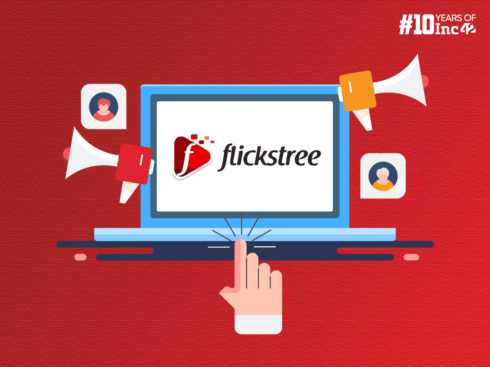
SUMMARY
Paytm And Flipkart Pay Top Startup Salary On The Tech Front
At present, ecommerce is the most paid sector. The startups in ecommerce tend to pay 20% higher salaries than other sectors. This data has been announced in a startup salary trends report by AI-based professional platform CutShort.io.
The CutShort.io report titled, “Salary Insights for Indian Startup 2016-17”, is based on insights from analysing real salaries from a sample of 50,000 CutShort users for the period between January 2016 to June 2017.
The CutShort.io study further finds that, in the 18 month period, fintech has seen an interesting trajectory. It hasn’t really been a funding guzzler but has paid more for professionals with more experience. This suggests that when it comes fintech, domain expertise clearly matters, as mentioned in the CutShort.io report.
Edtech, on the other hand, has been the slow tortoise amidst fast-moving rabbits. It pays less for high domain experience, in comparison to other sectors. It does seem as if, the way investors have tightened their purse strings during the so-called funding winter, so have edtech startup founders, when it came to paying top salary.
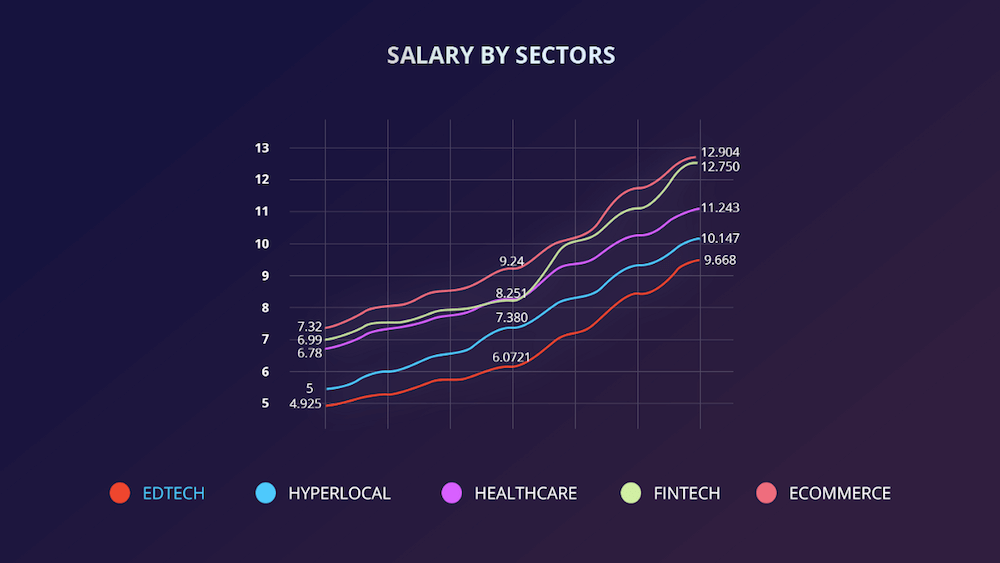
Also, there has been another side effect of the talent-hoarding by ecommerce companies — they became favorite poaching ground for the recruiters.
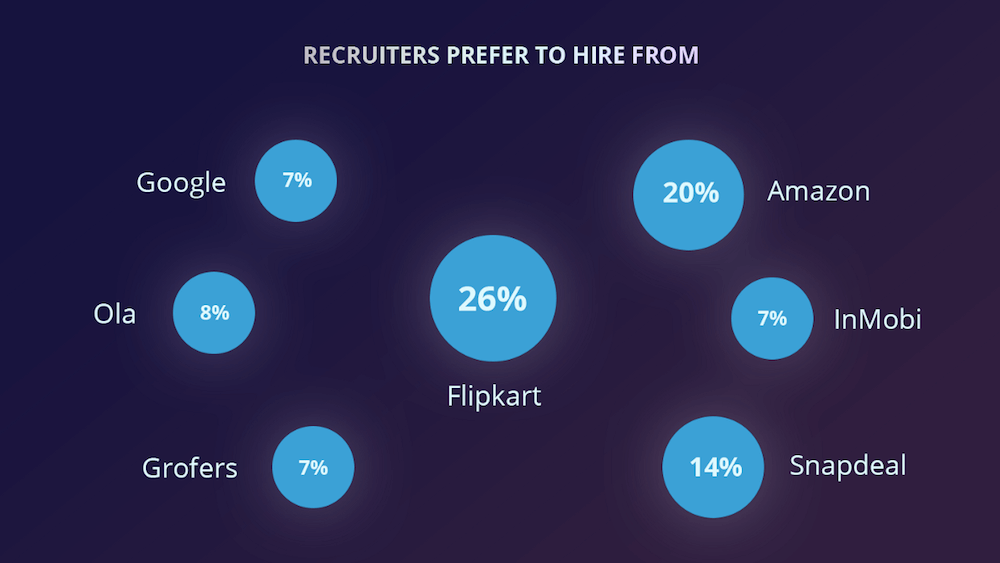
CutShort.io: Research Methodology And Key Trends
For the analysis of salary trends, the sample population selected in the CutShort.io analysis had an average work experience of 4.4 years.
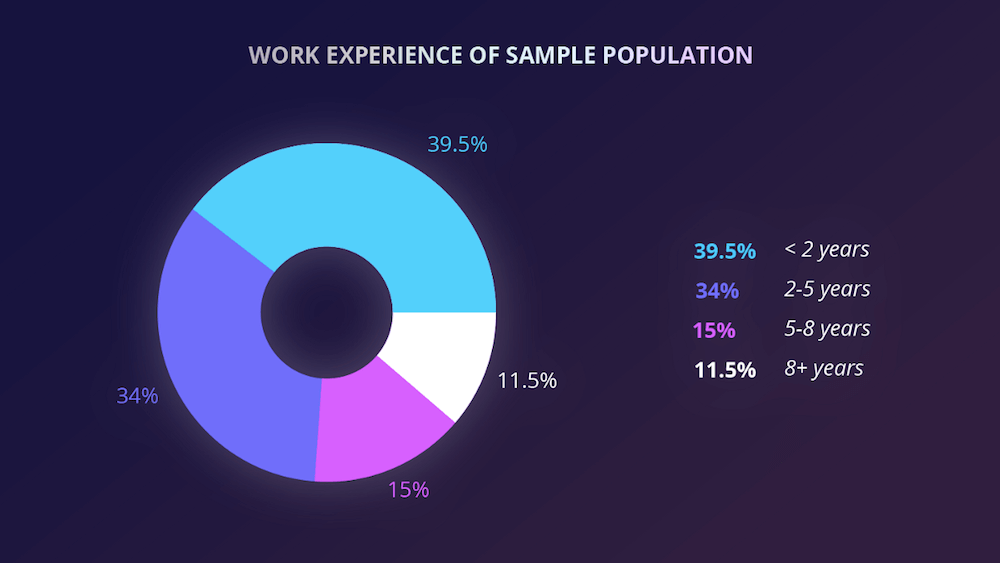
In addition, they have worked with over 11,700 startups/companies in total as shown in the image cloud below.
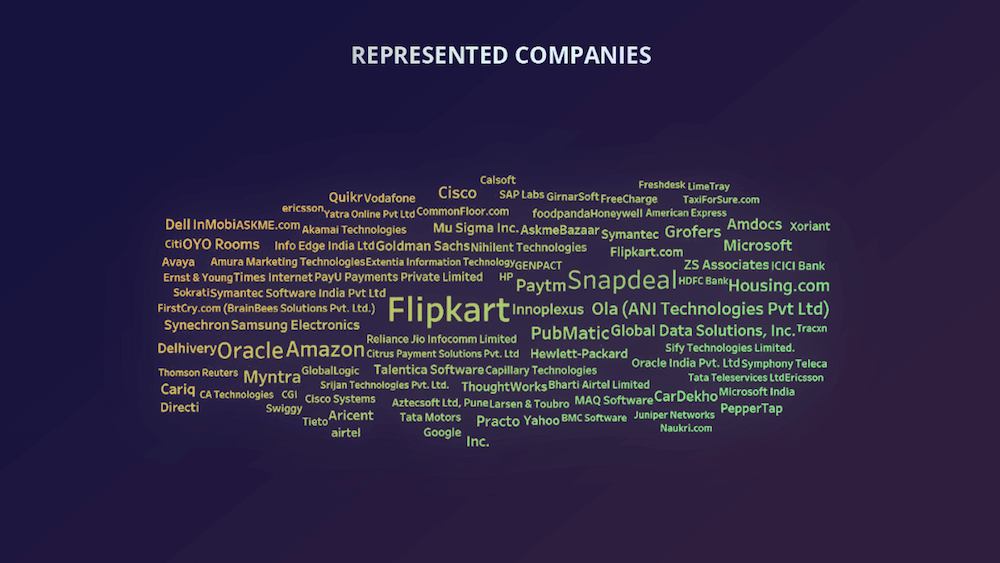
Image caption: Work experience of the sample population
The CutShort.io report further highlights the salary trends in terms of the highest-paying sector, cities, companies/ startups as well as different departments of the companies such as tech and marketing. The salary trends analysis is based on two data factors: the annual salary package in lakhs and the number of years of experience. Effectively, CutShort.io has come up with a Salary Calculator on basis of Salary/Experience ratio (S/E ratio = Salary/Years of experience) of the company.
The S/E ratio is a measure used in the industry to roughly estimate the market salary of an individual. For instance, if someone is earning a package of of INR 6 lakh per annum at an experience level of 3 years, the S/E ratio will be 2. If a company is paying higher S/E ratio for a job role, it indicates higher compensation being paid out, vis-a-vis the other companies in the market. A comparative analysis of S/E ratio can thus be helpful in analysing existing salary trends in various sectors.
The CutShort.io report aims to help startups as well as employees to answer the question, “what is my market worth?” in the current scenario.
As stated by Nikunj Verma, co-founder at CutShort.io, “For those of us who are recruiting or running their startups, this question becomes even more important. Offer too little and you will lose the target candidates silently. Offer too much and you start bleeding money, or worse attract the wrong kind of people to your company.”
Here are the three key startup salary trends as per the analysis:
- In the 18 months between January 2016-June 2017, salaries were found to be stronger than the previous years, given the previous years of funding situation and overall healthy growth rate.
- Bengaluru ruled the roost in the salaries, and Mumbai beat Delhi NCR as well as Hyderabad.
- The analysis also revealed that the lesser-known companies are paying more than the assumed leaders.
CutShort.io Startup Salary Insights: Key Trends
Unicorns Versus Non-Unicorns
It’s not the nine unicorns who are the highest paying companies in the country.
As per the CutShort.io report on salary trends, amongst their homegrown peers, the top five startups which have the highest S/E ratio include PSTakeCare (6.32), ZoomCar (5.38), Kony (4.56), TinyOwl (4.53) and BrowserStack (4.35). This list includes healthcare, travel, food, and SaaS companies.
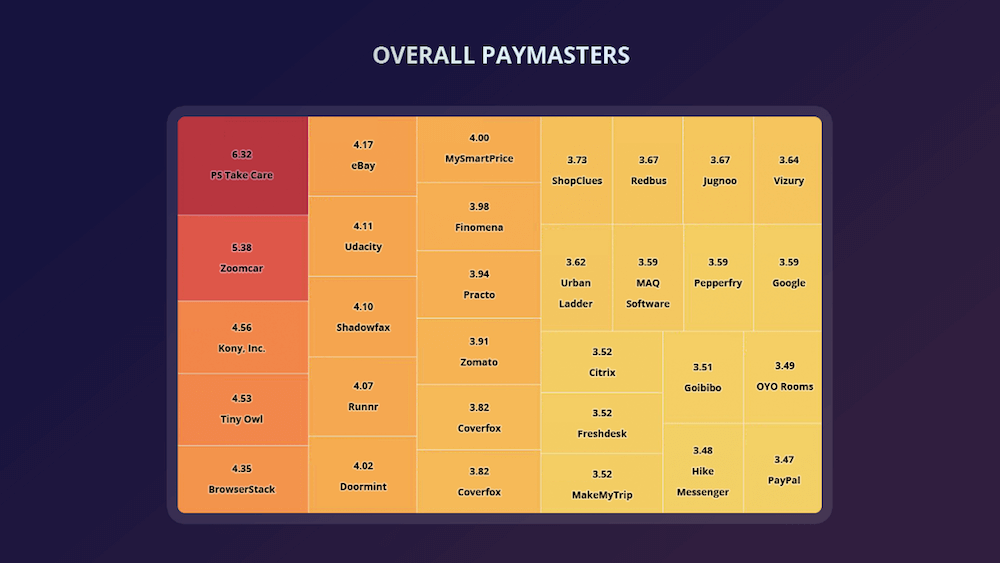
Flipkart And Paytm Lead The Pack In Tech Salary
Paytm and Flipkart do lead the pack when it comes to hiring top talents in tech, specifically. With Paytm currently dominating the fintech sector and Flipkart innovating with its product platform with Phonepe, Smartbuy and more, no wonder they need super talented techies who definitely come at a premium price. The two unicorns have even left behind core tech companies like Microsoft, MuSigma, Citrus, InMobi, and Google. But then again, with the big ticket funding of investors such as SoftBank and Tiger Global, they certainly have the deep pockets to pay high salaries.
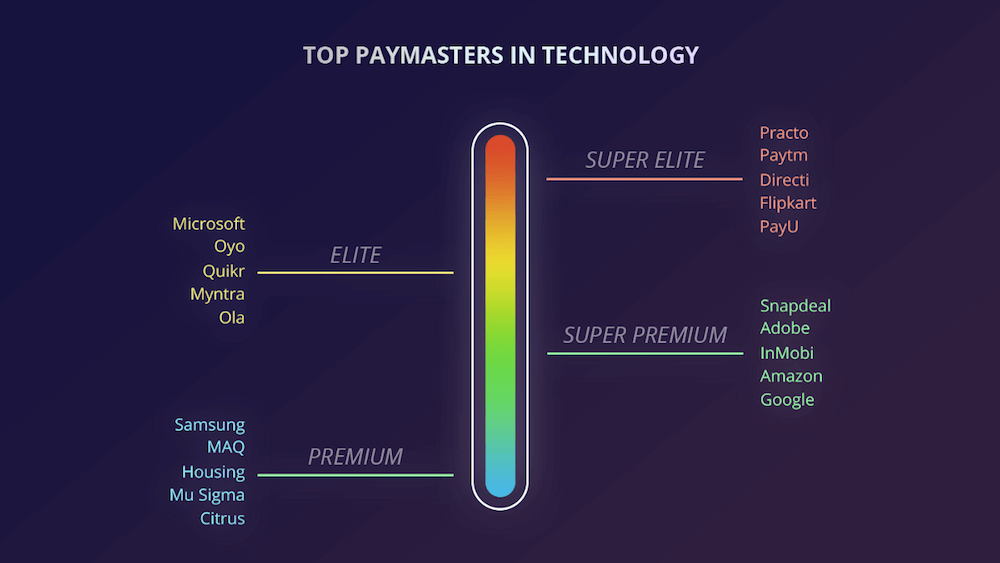
Non-Unicorns Lead The Non-Tech Salary Deck
When it comes to non-tech salary trends, Indian non-unicorns have grabbed the lead. However, it was surprising to see tech companies like FreshDesk and Vizuroi investing so heavily in non-tech.
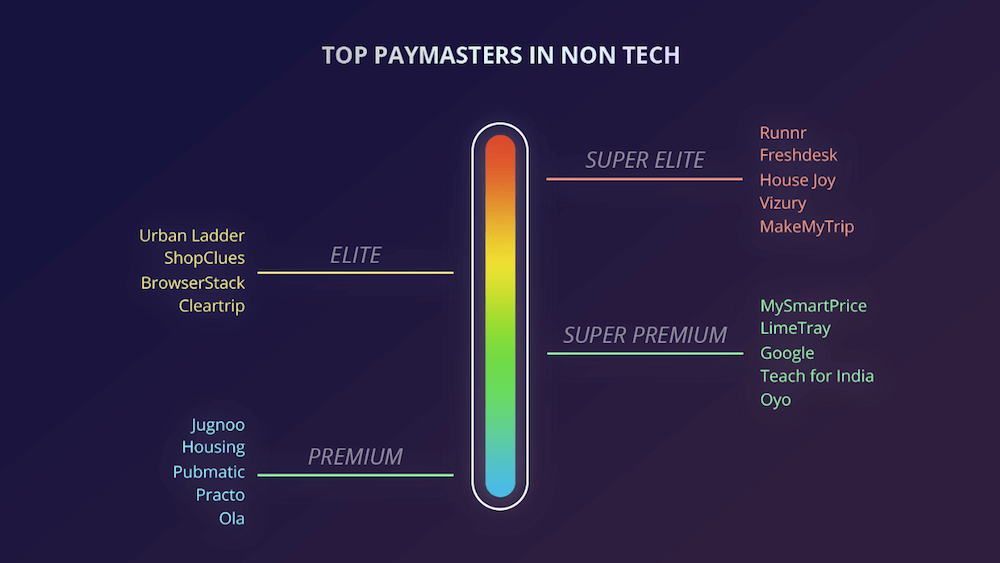
Techies vs Non-Techies
This is one of the major salary trends observed in the CutShort.io report. The techies in ecommerce sector have grabbed the strongest packages from the beginning, in comparison to their non-tech peers. Techies make 15% to 30% more than their non-tech counterparts. The difference widens with more work experience – indicating that techies get better salary increments compared to their counterparts.
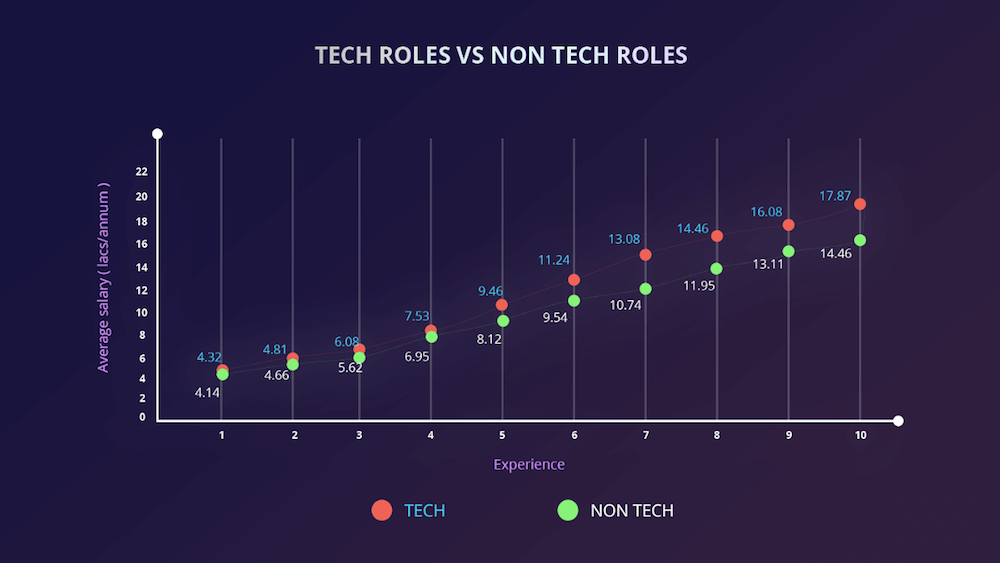
This trend seems counterintuitive to ecommerce platform co-founder Rohit Bansal who had stated that “there were not many opportunities for engineers to do high-quality (work)” back in 2015. Ironically, it was around the same time that the company also entered the best employers’ club, in a survey done by the Great Place To Work Institute India, in partnership with Retailers Association of India.
On the other hand, although marketers make 10% to 30% less salary at a middle level, their salaries become almost equivalent to the techies once they cross the 10-year experience mark.
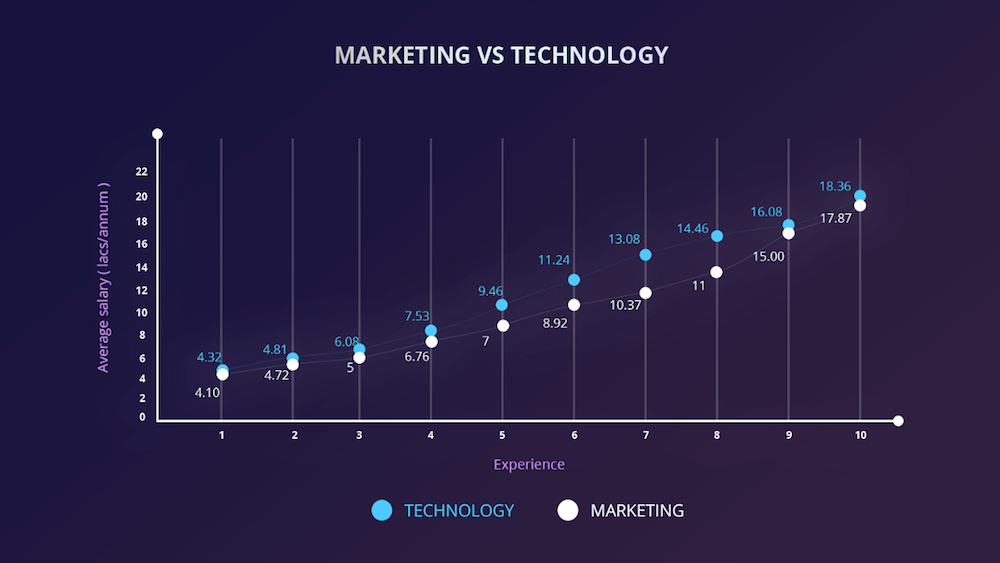
Tech And Non-Tech Salary Trends in Prime Tier I Cities
When it comes to salary trends in tech, Bengaluru is the leader and has been considered the best place for tech jobs. Mumbai being the financial capital of India remains in sync with its title and beat NCR. Surprisingly, Hyderabad has taken the third position, beating Delhi-NCR and debuting on the startup salary trends map.
This is the second time Hyderabad has beat Delhi/NCR this year. Earlier in March 2017, Hyderabad was crowned as the best city to live in above Delhi and Mumbai by Mercer’s Quality of Living rankings 2017.
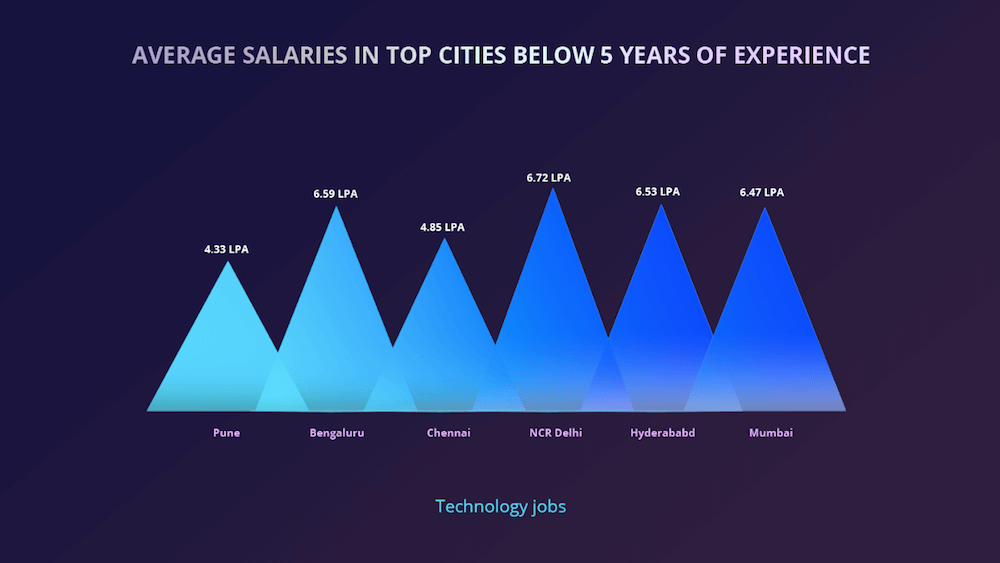
Bengaluru, often considered the ‘Silicon Valley of India’ is an incredible destination for techies due to its proximity to tech companies – both startups and otherwise. Bengaluru also offers higher salaries to experienced techies, as compared to other cities, where salary growth plateaued with experience.
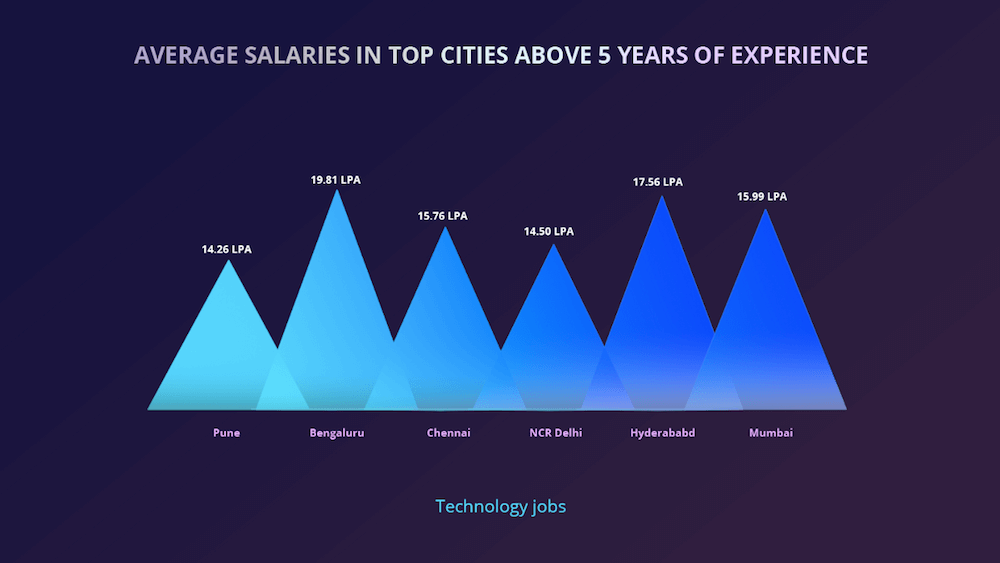
In terms of non-tech talent, Mumbai managed to beat Bengaluru in the lower experience bracket.
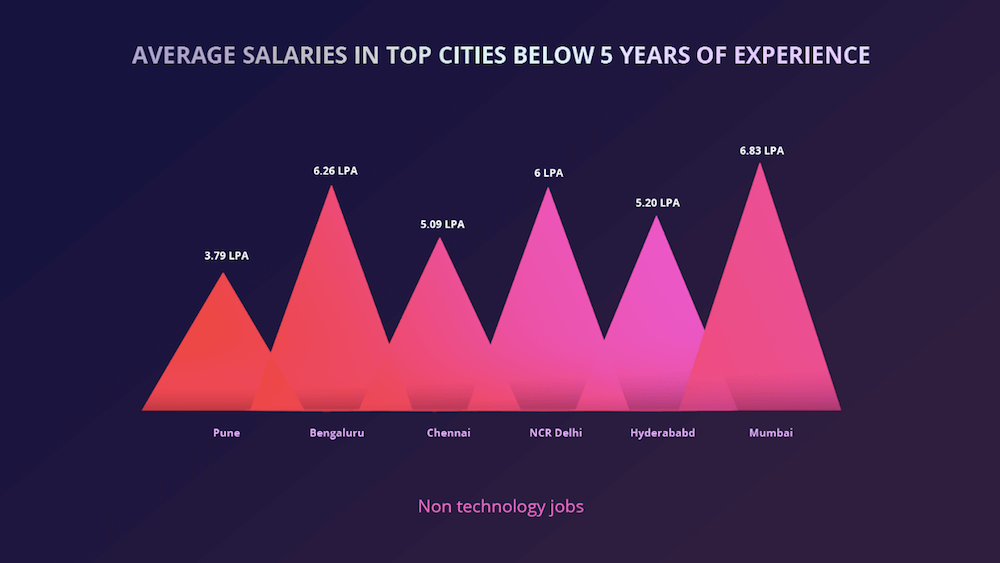
But for employees with higher experience, Bengaluru took the top slot again, leaving Mumbai second, while NCR Delhi came a clear third, as per the salary trends observed in the CutShort.io study.
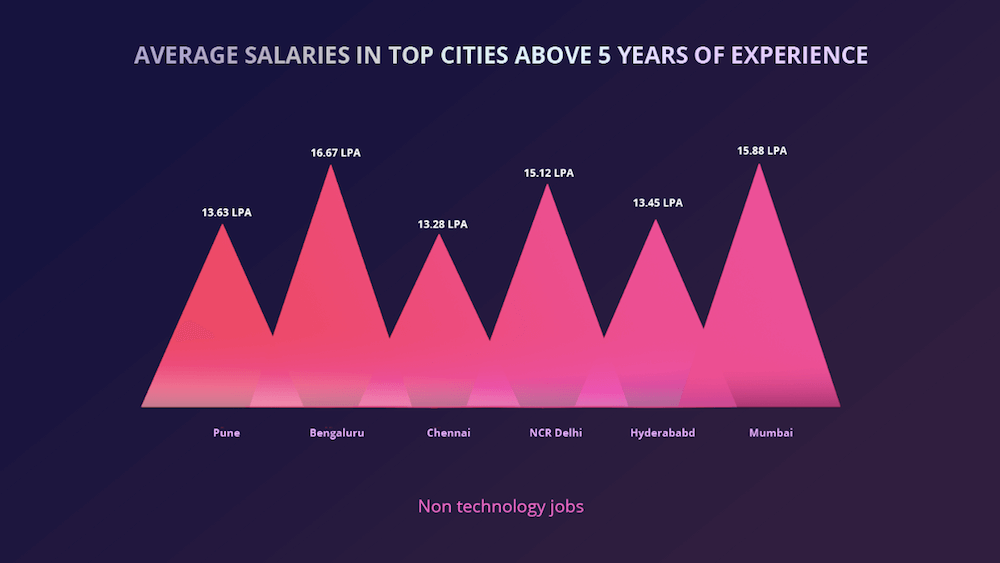
Also, while Bengaluru and Mumbai lead in salary, Pune and Chennai are the most economical. This can be factored due to cheaper real estate costs and relative lack of competition within the companies.
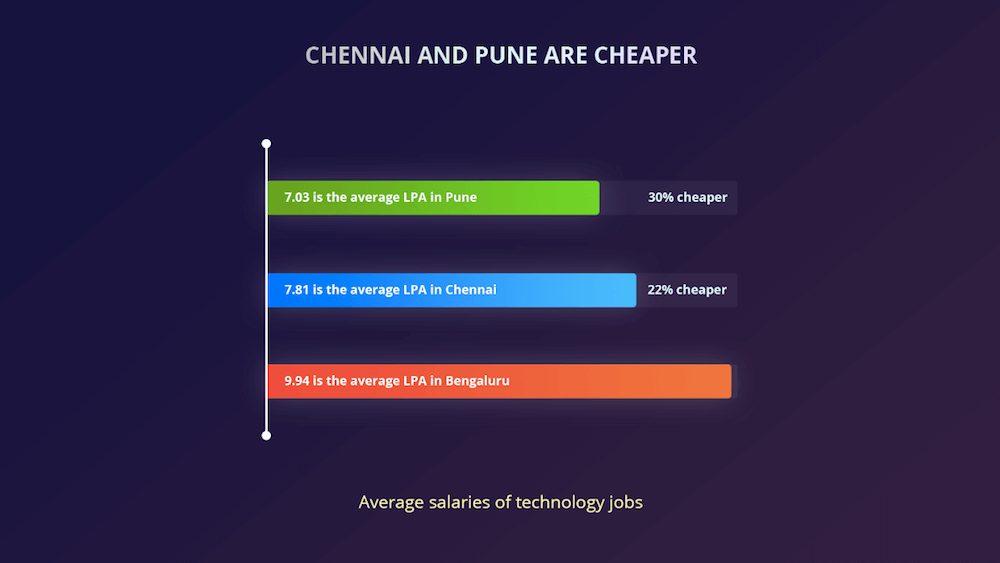
Although top talent is less available in these two cities, costs are 30% lower with lower rates of attrition, in both tech and non-tech jobs.
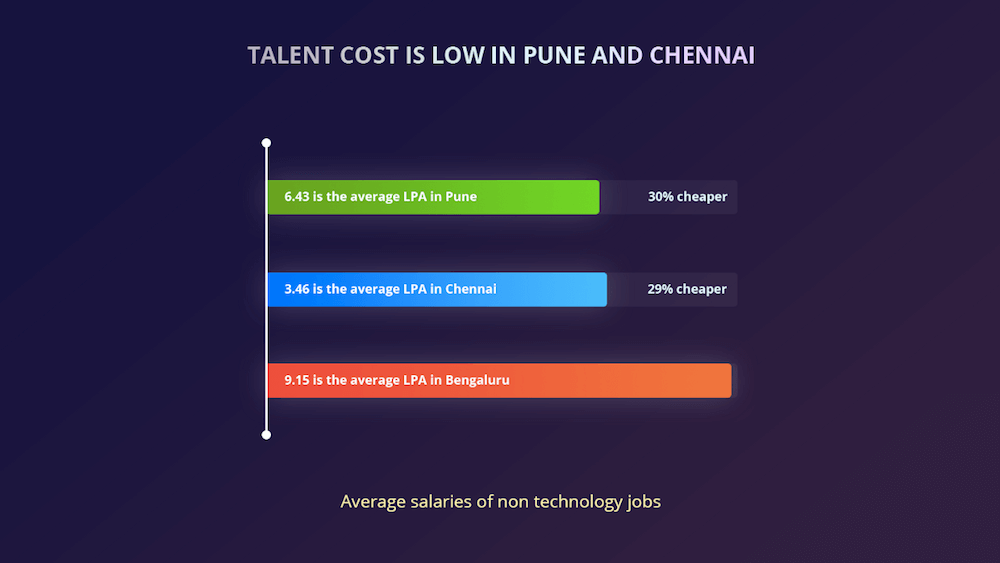
Startup Salary Trends in India: 2016-2017
When one talks about a well-funded startup or a startup achieving profitability quarter after quarter, the first thing we think of is a classy office space and a high seven-to-eight-figure salary package for employees. Plus, when you get a glimpse of CEO salaries, which in some cases go beyond $465K (like that of Paytm CEO Vijay Shekhar Sharma), potential employees are eager to join such companies.
But due to these higher packages, Indian unicorns have been blamed for ruining the salary trends in the startup community. With millions in funding from foreign investors, beating out competition by offering more and more attractive packages; these startups have taken startup salary standards to a new height. As per a recently released Inc42 Data Labs report, between January to June 2017 only a total of $5.3 Bn funds have been infused into the Indian startups.
Startups have even taken the place of the once dominant IT industry. These startups now stand as the frontrunners to nab the finest talent from premium Indian education institutes – a place reserved sometime back for behemoths like Google and Facebook.
A Quartz article released in January 2017 showcased the ridiculously high salaries being offered to Flipkart’s top executives: from $1.5 Mn – $5.47 Mn (INR 10.1 Cr-INR 35.3 Cr) for 4-11 years’ work experience. Now, these figures are obviously the CTC (cost to company), including travel, HR, allowances etc., along with gratuity and provident funds. Sometimes, ESOPs are also a part of the top executives’ remuneration.
The same article revealed another shocking figure. Between April 2015 and March 2016, Flipkart spent $46.5 Mn (INR 300 Cr) on the remuneration of top-paid employees alone. No wonder, Flipkart’s losses piled up to the extent of $894 Mn (INR 5769 Cr) for FY 16.
A similar salary trend was shared by Mahesh Murthy on his Facebook post in August 2016. He revealed some of the CVs of employees from failed startups, who were asking/expecting huge amounts at considerably low experience levels.
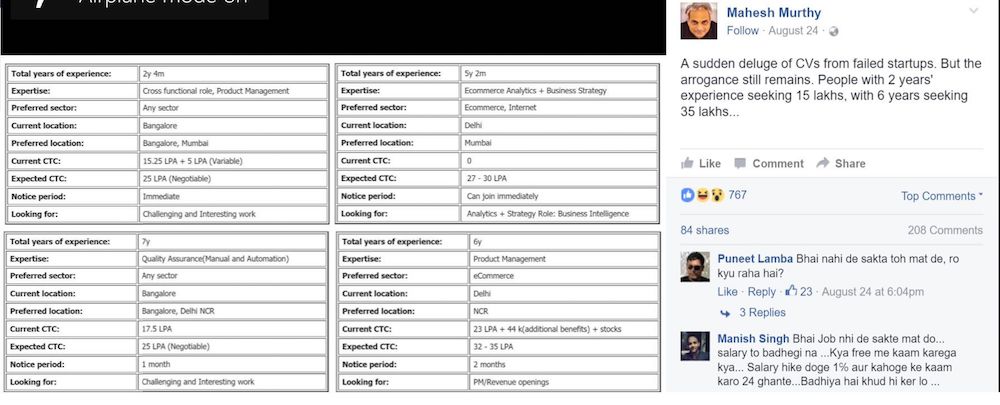
Also, middle management executives, specifically the tech and marketing teams, get higher packages in comparison to their peers in other corporates. As stated in a January 2017 ET article, “Software engineers hired at ecommerce companies like Amazon and Flipkart are guaranteed to get a salary that ranges anywhere between $54K – $77K (INR 35 Lakhs-INR 50 Lakhs) per annum. The same goes for software engineers hired for Google and Microsoft. In some cases, they are even given a salary higher than $77K (INR 50 Lakhs) as ‘cost-saving’ is not a priority for these companies, but getting the right talent is.”
All in all, this has considerably raised startup salary expectations from the perspective of incoming talent of almost all sectors in the ecosystem. As per the 20th edition of the Aon Hewitt annual Salary Increase Survey 2015-16, early stage companies and startups were expected to offer the highest salary increase, 15.6%, during 2016.
But as the ‘funding winter’ continued, salary hike margins and prospective packages descended. A recent study by Aon Hewitt, released in March 2017, suggested the overall startup salary hike dropped to 12.5% from the previous 15.6% (although it’s still the highest as compared to other industries). Other industry analysts have further dropped the number to 5%-6%, as cited in a report. Also, in March 2017 it was reported an over 50% drop in the number of startup executives in India with more than $155K (INR 1 Cr) salary.
With investors keen on rationalising their investments and earn profits, even highly-funded unicorns are under pressure to tighten their belts and lay off non-performing employees.
A clear example of this was the leadership restructuring at Flipkart. Co-founders Sachin and Binny Bansal were both asked to step down from the CEO position wherein Sachin Bansal himself admitted that the decision has been taken due to his performance issues. Currently, Kalyan Krishnamurthy, a representative of Flipkart’s earliest backer Tiger Global Management, sits on the CEO throne.
The way Japanese VC firm Softbank has pushed itself in H1 2017 to consolidate all its loss-making entities in India, further illustrates this fact. Again, the rising losses have also forced firms to do considerable layoffs or merge their operations. For instance, during FY16-17, while Flipkart laid off over 700 employees on performance grounds, Snapdeal laid off 600 employees, while Housing.com was entirely merged with PropTiger.
At this point of time, these companies have also had to face the ire of Indian education institutions, from where they culled the top candidates. Be it Flipkart, Grofers, Housing, Snapdeal – all had to face the consequences from IITs, IIMs for revoking/ delaying their job offers last year.
Also, with over 500 startup shutdowns between January 2015-June 2017 and several pivots, the number of employees sacked can only be imagined. Even the IT conglomerates like Infosys, urged its top executives last month in June to cut down their salaries to stop IT layoffs. While Wipro and TCS are laying off low-level employees in the wake of automation and a not-outsourcing-friendly market.
Year on Year Startup Salary Hikes: What Can Be Done To Negate The Effect
So, why do startups tend to pay higher? While offering remuneration, startups tend to consider two main factors – the risk involved and the degree of talent required. To match both, top executives are sometimes hired from Silicon Valley companies or other top notch firms in India, all of which comes at a premium pricing. Plus, to curb the high attrition rates, employers need to provide high incentives and perks which will again cost them dearly.
For instance, according to the Analytics and Big Data Salary Report 2016 by Jigsaw Academy and Analytics Vidhya, “Unlike large companies, which pay around INR 9.6 Lakhs, Indian startups are willing to pay over INR 10.8 Lakhs per annum to attract the best talent in the analytics industry. Also, analysts experience the biggest jump in salaries once they have clocked five years in the industry, and can expect a raise of up to 70% with an average pay of INR 12.3 Lakhs p.a.”
By 2020, India is expected to be home to 11,500 startups, employing nearly 2,50,000 people. Thus, the demand-supply ratio can be expected to be maintained.
Again, sometimes the skill set required by digital platforms for a particular role in the organisation is not available – a prime reason for giving high salary packages. A significant role can be played here by upcoming and established skill-based online learning platforms like Udacity, Unacademy, Acadgild and more.
Also, on the personal front, startup founders can fix their own salary calculators -a formula or any kind of mechanism to play a fair game and inculcate trust in their employees. For instance, at social media company Buffer, the salaries from top to lower level management are determined by a fixed formula.
“It really helps with having great teamwork and less politics,” says Joel Gascoigne, CEO, Buffer.
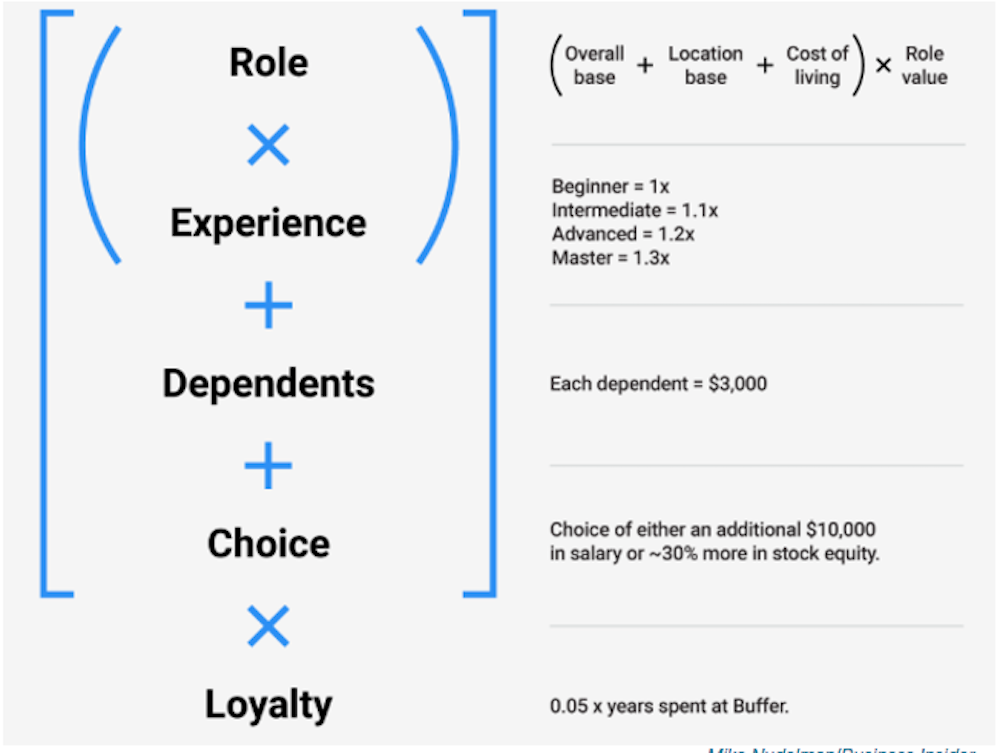
Image Credit – Business Insider
Money matters. There is no doubt that when it comes to figuring out the salary of a prospective employee, an organisation – whether a startup or an established incumbent – look for experience, enthusiasm, and that X factor that makes a potential candidate the right fit. According to the Cutshort.io startup salary trends report, it can also be inferred that it’s not just about the money, though.
Perhaps, that is the reason smaller names such as ZoomCar and PSTakeCare have grabbed pole position. But, it also has to be noted that the next generation of employees – the Millennials – count job satisfaction as almost as important as the salary they earn. How the companies in India are able to provide for this X factor will decide upcoming salary trends in the foreseeable future.








